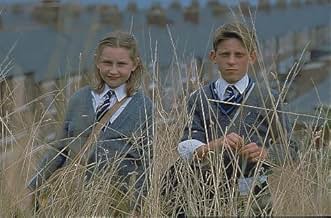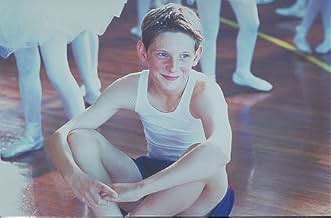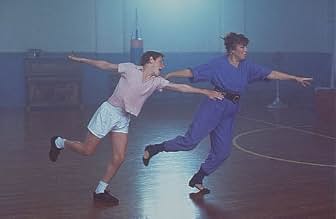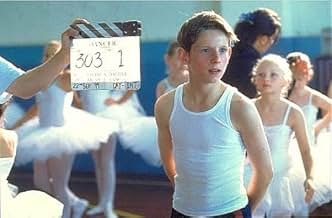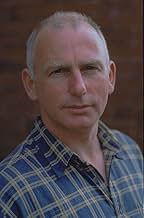Billy Elliot
- 2000
- Tous publics
- 1h 50min
Billy, d'une famille de grévistes, s'entraîne dur à boxer comme tous les garçons de mineurs. Mais au gymnase, il ne peut s'empêcher de lorgner du côté des filles en tutu, au point de s'essay... Tout lireBilly, d'une famille de grévistes, s'entraîne dur à boxer comme tous les garçons de mineurs. Mais au gymnase, il ne peut s'empêcher de lorgner du côté des filles en tutu, au point de s'essayer un jour à faire des pointes avec elles.Billy, d'une famille de grévistes, s'entraîne dur à boxer comme tous les garçons de mineurs. Mais au gymnase, il ne peut s'empêcher de lorgner du côté des filles en tutu, au point de s'essayer un jour à faire des pointes avec elles.
- Réalisation
- Scénario
- Casting principal
- Nommé pour 3 Oscars
- 55 victoires et 71 nominations au total
- Mr. Wilkinson
- (as Colin Maclachlan)
- Simon
- (as Matthew Thomas)
Avis à la une
Quite simply, this is the best British movie in years. All the characters are intriguing, and the acting is flawless, most notably from 14-year-old Jamie Bell whose acting is utterly convincing, filled with humour and insight beyond his years. He is also a fantastic dancer, and some of the dance sequences are reminiscent of the dance-filled musicals of the old black and white movies.
The backdrop of the historic miners' strike of the mid-1980s, it brings the story down to the earth and adds the necessary tension to make this film truly believable and a worthy story to tell.
I find it hard to see how anyone would not like this film. 9 and a half out of 10.
Born in a socially and economically repressed mining town, Billy is told that boys box or wrestle; boys don't dance. But Billy loves to dance and does so every chance that he gets.
Does a love of ballet make you gay? Does it matter if your best friend is a crossdresser? How far will a father go when he realizes the truth about his son? This is a movie of change, growth and emotion, with characters and actors so real and fully developed that they pull your heart forth and place it firmly upon the screen. We literally feel the brittleness of judgement, the despair of lost hope, and the joy of acceptance.
It is easy to see why this small British film has won so many foreign awards and nominations, and I only hope it will be given the chance it deserves to inspire and transform US audiences as well.
This is a tale of inter-masculine struggle in a family and mining town almost devoid of (and yearning for) a balancing feminine presence. Billy's gift is slowly awakened in this stressed and violent male crucible. His relationships with his brother, his father, his genderally confused classmate, and his teacher all grow increasingly charged as the movie develops. For honesty and presence, Jamie Bell as Billy far surpasses Haley Joel Osment's debut in The Sixth Sense. And if that's not enough, Julie Walters, Gary Lewis and Jamie Draven as Billy's teacher, dad and brother are all heartbreakingly portrayed. All are perfectly cast and at the very top of their form.
After all these characters have passed through the warzone of the first and second acts, director Steven Daldry delivers perhaps the most perfectly executed third act I have seen in a family centered drama from England or elsewhere. There are countless insightful decisions Daldry makes in the course of this film that other directors will study for years to come. But they're all brought to touching and masterful closure in the third act segments.
Kudos to scenarist Lee Hall for an excellent script. It should also be noted that many of DP Brian Tufano's beautifully composed shots match those of the great Chinese and Italian cinematographers. The film is brash in its musical style and forthright in its language. It is a film of specifics and the locale is not dressed up. And unlike many other local color films from England since 1985, this film has a strong, eminently compassionate narrative spine. Many audience members in the show I attended were immobilized and overcome in their seats during credits.
Despite frequent profanity, boys 11 and up should be allowed to see Billy Elliot, if only to keep them from abandoning hope. If it helps even one oppressed and confused boy keep an ear to the faint voice within that might just be his true calling, this film will have been worth every dollar spent in its making. A truly uplifting film.
It is also a piece of magic realism, with political overtones. By setting their near fairy tale in the context of a close-knit mining community, and more specifically against the backdrop of the 1984/5 miners' strike - a defining moment of modern British economic and social history - writer Lee Hall and director Stephen Daldry are able to refer to gender and class issues, without turning their work into a political tract, and without losing focus on the central human drama.
The film is realised near flawlessly. Bell achieves a convincing blend of adolescent bewilderment and defiance; if his dancing is not quite as good as we might expect, the storyline explains this away by saying that at this early stage his attitude and drive are more important than his technique. The dancing set pieces, clearly inspired more by Fred Astaire and Gene Kelly than by Nijinksky, are performed with gusto, mainly to pop songs by T-Rex.
Lewis and Draven put gritty realism and passion into their roles of a father and son committed to their community and to the miners' cause. They make us feel their despair as they realise that this cause is lost; but also their endurance as they come to terms both with Billie's aspirations and their own uncertain futures - within a few years most UK coalmines would be closed. (The colliery in Easington, the real-life location of the film, closed in 1994.). The scenes of violence between strikers and police are presented uncompromisingly and authentically, but with the occasional touch of humour.
Julie Walters provides an outstanding performance as Mrs Wilkinson, the dancing teacher who recognises and fosters Billie's talent; and helps him resist his own and his family's inhibitions. She is perfect as the chain-smoking, straight-talking mentor, who has her own personal disappointments and hurts, which she hopes Billie's success will help heal. To we outsiders watching the movie, Mrs Wilkinson appears as an integral part of the local community; but it is made clear that in the mid-80s, as far as Billie's family and friends are concerned, she is a middle class outsider, almost as alien as another species.
One issue which the film tackles head-on is traditional heterosexual male abhorrence of homosexuality. This attitude clearly underlies the shock of Billie's father and brother when they discover his interest in ballet. They would be even more horrified if they realised that his best friend was discovering gay tendencies in himself. It is typical of the sensitive direction that without labouring the point the film indicates by its close that attitudes towards gays changed radically during the 1980s and 90s along with the industrial landscape.
There are some great performances here, so let's get to em.
Jamie Bell plays the lead role, in an astonishing performance. Amazing dance routines done in perfect sync, I can just imagine the time he had memorizing all the steps. A knockout performance, with some of the most dramatic scenes played out with perfect honesty and realism.
Another notable performance comes from Julie Walters, who plays Mrs. Wilkinson, the dance instructor in the mining town where Billy lives. Once a great dancer but now forced to work in the bottom floor of a boxing hall, she plays her part wonderfully, showing the lack of compassion and jadedness without words but only through expressions, deep hurt lying beneath all that scorn, but love shining through as she sees Billy's true talent.
Finally, performance wise, we have Gary Lewis, who plays Billy's father. With wonderful scenes that play themselves out with harsh reality, I never tire of seeing the hurt in his eyes when he sees that his little boy isn't going to be a boxer or a football player, but a dancer, then seeing him again with the love and appreciation for his dancing son. Some things must be experienced, and the deep hurt he carries about the death of his wife is one of those. Greatness all around.
The one problem I did have with this movie is that it is first of all rated R. Why?! If it weren't for the few (and very effective) uses of the 'F' word, it would've gotten a PG-13 rating. It so strongly needs the 'F' word, yet it needs to be seen by a PG-13 audience! This is a move that truly should be shown to middle schoolers all over the country, showing that you should believe in yourself and no one else. Follow your dreams. Not only is this message not shoved down your throat (as some other movies shamelessly do), but it is done in such a way that you truly believe it. You want good things to happen, and you get that, but not spotless and clean. Nothing is done easily, and there will always be someone who will try and stop your dreams from coming true.
Another (and the only other problem) are the accents. The British definitely have a style of speaking all their own, and it sometimes took a moment for all the dialogue to register. Sometimes I'd miss half a scene, trying to decipher out exactly what was said. However, the tones and emotions of most scenes were enough to let you know what was said. Everything didn't have to be spelt out, but I can imagine that after I get this DVD I will sit down with the captions on, just to know I didn't miss anything. This is one of the only complaints I have for another favorite of mine, Lock, Stock and Two Smoking Barrels.
Billy Elliot is a true rag-to-riches story that unfolds amazingly well without pulling your heartstrings shamelessly as other movies love to do. I recommend this to all, expect to be entertained with great plot twists as well as interesting characters, wonderful dialogue, and a story that can never grow old: Follow your dreams.
Le saviez-vous
- AnecdotesJamie Bell was going through puberty at the time of filming. Some of his dialogue had to be post-synched as his voice had broken. And the opening scene in which he jumps up and down on a bed to T. Rex's "Cosmic Dancer" was shot over a lengthy period of time. For the latter takes, Bell had acquired hair on his legs and had to have them shaved.
- GaffesBilly's brother listens to music in his room (at around 42 mins) while wearing headphones but in cuts to the father and grandmother in other rooms in the house they hear the music as well. Some stereos allow the use of headphones and speakers together.
- Citations
Tutor 1: What does it feel like when you're dancing?
Billy: Don't know. Sorta feels good. Sorta stiff and that, but once I get going... then I like, forget everything. And... sorta disappear. Sorta disappear. Like I feel a change in my whole body. And I've got this fire in my body. I'm just there. Flyin' like a bird. Like electricity. Yeah, like electricity.
- Versions alternativesAn edited version was released in the USA rated PG-13 that tones down the language.
- Bandes originalesTop Hat, White Tie, and Tails
Performed by Fred Astaire
Courtesy of Turner Entertainment Co.
Composed by Irving Berlin
Irving Berlin Music Corp.
By kind permission of Warner/Chapplel Music Limited
Meilleurs choix
- How long is Billy Elliot?Alimenté par Alexa
Détails
- Date de sortie
- Pays d’origine
- Sites officiels
- Langue
- Aussi connu sous le nom de
- Dancer
- Lieux de tournage
- Easington, Peterlee, County Durham, Angleterre, Royaume-Uni(Rialto Cinema)
- Sociétés de production
- Voir plus de crédits d'entreprise sur IMDbPro
Box-office
- Budget
- 5 000 000 $US (estimé)
- Montant brut aux États-Unis et au Canada
- 21 995 263 $US
- Week-end de sortie aux États-Unis et au Canada
- 215 681 $US
- 15 oct. 2000
- Montant brut mondial
- 110 197 267 $US
- Durée1 heure 50 minutes
- Couleur
- Mixage
- Rapport de forme
- 1.85 : 1
Contribuer à cette page


![Regarder Trailer [OV]](https://m.media-amazon.com/images/M/MV5BZTAzNGQ0M2ItZGVhMi00OGY5LTgxMzgtZDBmYmMzZWM4OGQ0XkEyXkFqcGdeQXRyYW5zY29kZS13b3JrZmxvdw@@._V1_QL75_UX500_CR0)

